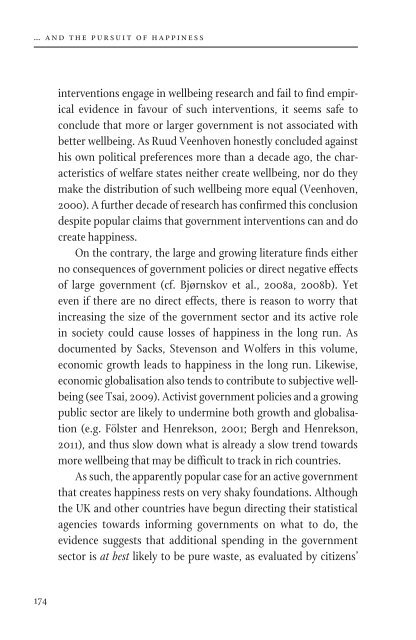… and the Pursuit of Happiness - Institute of Economic Affairs
… and the Pursuit of Happiness - Institute of Economic Affairs
… and the Pursuit of Happiness - Institute of Economic Affairs
You also want an ePaper? Increase the reach of your titles
YUMPU automatically turns print PDFs into web optimized ePapers that Google loves.
<strong>…</strong> <strong>and</strong> <strong>the</strong> pursuit <strong>of</strong> happiness<br />
wellbeing <strong>and</strong> <strong>the</strong> size <strong>of</strong> government<br />
interventions engage in wellbeing research <strong>and</strong> fail to find empirical<br />
evidence in favour <strong>of</strong> such interventions, it seems safe to<br />
conclude that more or larger government is not associated with<br />
better wellbeing. As Ruud Veenhoven honestly concluded against<br />
his own political preferences more than a decade ago, <strong>the</strong> characteristics<br />
<strong>of</strong> welfare states nei<strong>the</strong>r create wellbeing, nor do <strong>the</strong>y<br />
make <strong>the</strong> distribution <strong>of</strong> such wellbeing more equal (Veenhoven,<br />
2000). A fur<strong>the</strong>r decade <strong>of</strong> research has confirmed this conclusion<br />
despite popular claims that government interventions can <strong>and</strong> do<br />
create happiness.<br />
On <strong>the</strong> contrary, <strong>the</strong> large <strong>and</strong> growing literature finds ei<strong>the</strong>r<br />
no consequences <strong>of</strong> government policies or direct negative effects<br />
<strong>of</strong> large government (cf. Bjørnskov et al., 2008a, 2008b). Yet<br />
even if <strong>the</strong>re are no direct effects, <strong>the</strong>re is reason to worry that<br />
increasing <strong>the</strong> size <strong>of</strong> <strong>the</strong> government sector <strong>and</strong> its active role<br />
in society could cause losses <strong>of</strong> happiness in <strong>the</strong> long run. As<br />
documented by Sacks, Stevenson <strong>and</strong> Wolfers in this volume,<br />
economic growth leads to happiness in <strong>the</strong> long run. Likewise,<br />
economic globalisation also tends to contribute to subjective wellbeing<br />
(see Tsai, 2009). Activist government policies <strong>and</strong> a growing<br />
public sector are likely to undermine both growth <strong>and</strong> globalisation<br />
(e.g. Fölster <strong>and</strong> Henrekson, 2001; Bergh <strong>and</strong> Henrekson,<br />
2011), <strong>and</strong> thus slow down what is already a slow trend towards<br />
more wellbeing that may be difficult to track in rich countries.<br />
As such, <strong>the</strong> apparently popular case for an active government<br />
that creates happiness rests on very shaky foundations. Although<br />
<strong>the</strong> UK <strong>and</strong> o<strong>the</strong>r countries have begun directing <strong>the</strong>ir statistical<br />
agencies towards informing governments on what to do, <strong>the</strong><br />
evidence suggests that additional spending in <strong>the</strong> government<br />
sector is at best likely to be pure waste, as evaluated by citizens’<br />
happiness. Instead, when asking what government can do for you<br />
in terms <strong>of</strong> happiness, <strong>the</strong> proper answer seems to be an echo <strong>of</strong><br />
Adam Smith’s famous 1755 lecture: ‘peace, easy taxes, <strong>and</strong> a tolerable<br />
administration <strong>of</strong> justice; all <strong>the</strong> rest being brought about by<br />
<strong>the</strong> natural course <strong>of</strong> things’ (cf. Frey <strong>and</strong> Stutzer, 2000; Bjørnskov<br />
et al., 2010). In <strong>the</strong> present political circumstances, however,<br />
<strong>the</strong>re are few votes to be had from such promises. Policies actually<br />
conducive to average happiness are nei<strong>the</strong>r sexy, nor likely to<br />
attract more votes.<br />
References<br />
Bergh, A. <strong>and</strong> M. Henrekson (2011), ‘Government size <strong>and</strong><br />
growth: a survey <strong>and</strong> interpretation <strong>of</strong> <strong>the</strong> evidence’, Journal<br />
<strong>of</strong> <strong>Economic</strong> Surveys, forthcoming.<br />
Bjørnskov, C., A. Dreher <strong>and</strong> J. A. V. Fischer (2007), ‘The bigger<br />
<strong>the</strong> better? Evidence <strong>of</strong> <strong>the</strong> effect <strong>of</strong> government size on life<br />
satisfaction around <strong>the</strong> world’, Public Choice, 130: 267–92.<br />
Bjørnskov, C., A. Dreher <strong>and</strong> J. A. V. Fischer (2008a), ‘Crosscountry<br />
determinants <strong>of</strong> life satisfaction: exploring different<br />
determinants across groups in society’, Social Choice <strong>and</strong><br />
Welfare, 30: 119–73.<br />
Bjørnskov, C., A. Dreher <strong>and</strong> J. A. V. Fischer (2008b), ‘On<br />
decentralization <strong>and</strong> life satisfaction’, <strong>Economic</strong>s Letters, 99:<br />
147–51.<br />
Bjørnskov, C., A. Dreher <strong>and</strong> J. A. V. Fischer (2010), ‘Formal<br />
institutions <strong>and</strong> subjective wellbeing: revisiting <strong>the</strong> crosscountry<br />
evidence’, European Journal <strong>of</strong> Political Economy, 26:<br />
419–30.<br />
174 175












